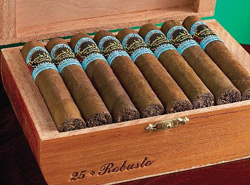Recently, the National Assembly passed the bill for making reforms in the “law about payments for cigar production”.
It is rare to see the National Assembly pass a law, which reduces the taxes and customs taxes on products. With this law in particular, it is expected to reduce the 1,500,000 AMD pay rate for cigar imports (counting 1000 cigars) by three times.
Among other reasons, the change in the law was also criticized because the author of the draft was MP of the United Labor Party faction Mnatsakan Petrosyan. Businessman Pavel Khachatryan is mainly the one involved with cigar imports in Armenia (he is representative of “Puma”, “Diadora”) and he has close ties with leader of ULP Gurgen Arsenyan. Besides that, there were some rumors going around that Gurgen Arsenyan is planning on importing cigars and the passing of the bill was politicized. The ULP substituted the Rule of Law in the coalition and took on some responsibility. Since the passing of the bill coincided with the recent political events, it was looked at as a present from the “authorities” to the ULP. Leaving aside politics and friendly ties, let’s try and understand whether it’s really worth criticizing this change or not. After all, we must criticize the economic laws and resolutions, which actually endanger the country. From the businessman’s perspective, this is truly a positive step. The tax reduction means low prices and bigger consuming. The consumer gains since he no longer has to pay the high tax.
This doesn’t hurt local producers either. The local producers are mainly the ones complaining about the importing tax reduction, claiming that it goes against their interests. But that’s totally illogical because there is no cigar producer in Armenia.
All that’s left is the state’s interest, better yet the damage, which can be looked at as the decrease in money going to the budget. If the tax price goes down, then eventually the budget amounts decrease too. Is it really that horrible? The “law on payments for cigars” was passed in March 2000. According to that law, the individuals considered as constant payers are the importers that import more than 10 cigars. According to the same law, it was expected to pay 3 dollars for each cigar despite the original price of the cigar. A reform was made in May 2005-1,500,000 for every 1000 imported cigars (1500 drams for each cigar). In 2005, based on the data of the State Customs Committee, there were only 400 cigars imported to Armenia and 600,000 AMD went to the state budget. Author of the bill Mnatsakan Petrosyan was the one who gave us this information. However, according to him, 20,000 cigars have been imported into Armenia.
Of course, Mr. Petrosyan was subjective when stating that number. Specialists in this field say that the cigar market is small in Armenia. Only rich people smoke cigars in Armenia and not everyone. They don’t buy cigars in Armenia, but rather bring them after their visits abroad or simply get cigars as presents. The owner of one of the well-known stores of Armenia told us that the store only sold 2 cigars in two months.
But we can prove that the “400” cigars is not the real thing with just one proof: today you can buy a cigar for 1200 drams, in other words, lower than the fixed 1500 drams. This means that the cigar importers are circumventing the State Customs Committee. Mr. Petrosyan also stated that the majority of cigars in Armenia are bought from the “duty free” stores. In summary, we can say that Armenian economy doesn’t really benefit from the laws and it’s probably not worth paying much attention to it. Only time will show what we’ll get out of the passing of the reformed law. Although Petrosyan didn’t mention who the potential importers are going to be, but he ascertained that we will have a positive outcome. He advised to follow the dynamics of prices paid for cigars and assured that there will be a difference in current and future prices. We will take his advice and perhaps find out who is really worried over the interests of Armenian cigar lovers “while we’re at it”.

